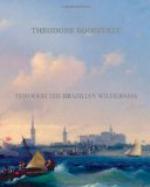That day we got only half-way down the rapids. There was no good place to camp. But at the foot of one steep cliff there was a narrow, boulder-covered slope where it was possible to sling hammocks and cook; and a slanting spot was found for my cot, which had sagged until by this time it looked like a broken-backed centipede. It rained a little during the night, but not enough to wet us much. Next day Lyra, Kermit, and Cherrie finished their job, and brought the four remaining canoes to camp, one leaking badly from the battering on the rocks. We then went down-stream a few hundred yards, and camped on the opposite side; it was not a good camping-place, but it was better than the one we left.
The men were growing constantly weaker under the endless strain of exhausting labor. Kermit was having an attack of fever, and Lyra and Cherrie had touches of dysentery, but all three continued to work. While in the water trying to help with an upset canoe I had by my own clumsiness bruised my leg against a boulder; and the resulting inflammation was somewhat bothersome. I now had a sharp attack of fever, but thanks to the excellent care of the doctor, was over it in about forty-eight hours; but Kermit’s fever grew worse and he too was unable to work for a day or two. We could walk over the portages, however. A good doctor is an absolute necessity on an exploring expedition in such a country as that we were in, under penalty of a frightful mortality among the members; and the necessary risks and hazards are so great, the chances of disaster so large, that there is no warrant for increasing them by the failure to take all feasible precautions.
The next day we made another long portage round some rapids, and camped at night still in the hot, wet, sunless atmosphere of the gorge. The following day, April 6, we portaged past another set of rapids, which proved to be the last of the rapids of the chasm. For some kilometres we kept passing hills, and feared lest at any moment we might again find ourselves fronting another mountain gorge; with, in such case, further days of grinding and perilous labor ahead of us, while our men were disheartened, weak, and sick. Most of them had already begun to have fever. Their condition was inevitable after over a month’s uninterrupted work of the hardest kind in getting through the long series of rapids we had just passed; and a long further delay, accompanied by wearing labor, would have almost certainly meant that the weakest among our party would have begun to die. There were already two of the camaradas who were too weak to help the others, their condition being such as to cause us serious concern.




